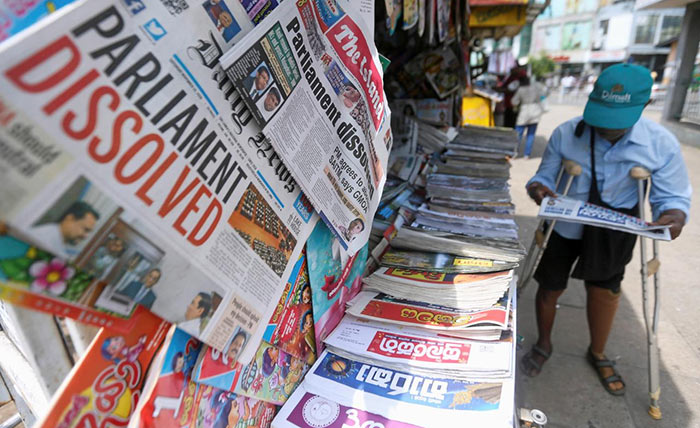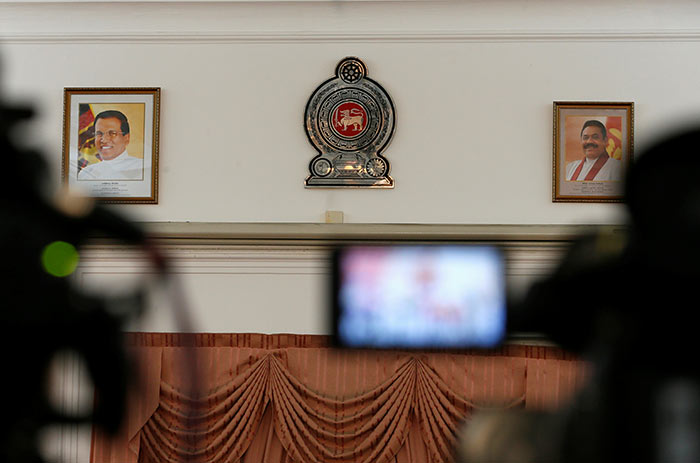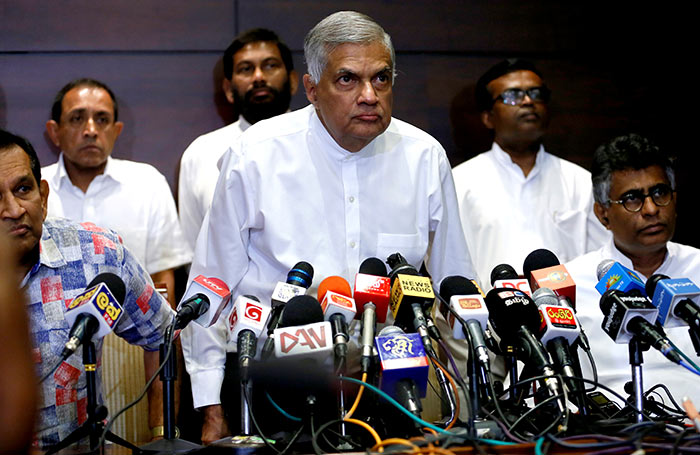U.S. and others denounce dissolution of Sri Lanka parliament as undemocratic

Sri Lanka President Maithripala Sirisena’s decision to dissolve parliament, worsening an already major political crisis, has drawn criticism from Western powers, including the United States and Britain.
Sirisena dissolved parliament on Friday night, only five days before it was due to reconvene, but a new cabinet he installed was in danger of losing a vote of no confidence. Sirisena also called a general election for Jan. 5.
The president triggered a power struggle when he sacked prime minister Ranil Wickremesinghe late last month and appointed the island’s former leader, Mahinda Rajapaksa, a pro-China strongman defeated by Sirisena in an election in 2015, in his place.
Sirisena’s rivals are set to challenge his decision, which they describe as illegal and unconstitutional, in the Supreme Court on Monday.
The U.S. Bureau of South and Central Asian Affairs said in a tweet that the United States was “deeply concerned by news the Sri Lanka Parliament will be dissolved, further deepening the political crisis”. It said democracy needed to be respected to ensure stability and prosperity.
Mark Field, the British minister of State for Asia and the Pacific, tweeted his concern about the dissolution of parliament days before it was due to be reconvened.
“As a friend of Sri Lanka, the UK calls on all parties to uphold the constitution and respect democratic institutions and processes,” Field said.
Canada’s Foreign Policy twitter feed said that it was “deeply concerned” about the decision and referred to the risks to reconciliation work after the nation’s civil war.
“This further political uncertainty is corrosive to Sri Lanka’s democratic future and its commitments on reconciliation and accountability,” it said.
Australian Minister for Foreign Affairs Marise Payne expressed both concern and disappointment in a statement, saying the move “undermines Sri Lanka’s long democratic tradition and poses a risk to its stability and prosperity”.
Sirisena has said he fired Wickremesinghe because the prime minister was trying to implement “a new, extreme liberal political concept by giving more priority for foreign policies and neglecting the local people’s sentiment”.
PARLIAMENT TEST
Mangala Samaraweera, an ally of Wickremesinghe, said their party expects the court to rule that the dissolution of parliament was illegal and that eventually a vote in parliament will be held to test whether there is a majority.
“We will show that we have the parliament majority and we will show that the dictator president has dissolved a government which had a majority in the parliament,” he told reporters.
They were supported by the Tamil National Alliance, the main party representing ethnic Tamil groups in parliament, who said they too will petition the Supreme Court against the dissolution of the house.
“This is a clear violation of the constitution. The president can’t do this,” M.A. Sumanthiran, a spokesman for the alliance, told Reuters.
India and the West have raised concerns over Rajapaksa’s close ties with China. Beijing loaned Sri Lanka billions of dollars for infrastructure projects when Rajapaksa was president between 2005-2015, putting the country deep into debt.
Wickremesinghe refused to vacate the official prime minister’s residence saying he was the prime minister and had a parliamentary majority.
Before he signed the papers dissolving parliament and calling the election, Sirisena appointed allies of his and of Rajapaksa to cabinet positions.
One of them said Sirisena was right to order an election to end the political crisis. Dinesh Gunawardena, a newly appointed urban development minister, said the president had handed the country back to the people.
“It is the people’s right to vote. We have gone before the people. No force can interfere. The people’s mandate is supreme,” he said.
Independent legal experts have told Reuters that parliament could be dissolved only in early 2020, which would be four-and-half-years from the first sitting of the current parliament. The only other legal way would be through a referendum, or with the consent of two thirds of lawmakers.
Given those views, it was not immediately clear how Sirisena is on legal safe ground by dissolving parliament, though his legal experts have said there are provisions for him to do so.
(Source: Reuters – By Shihar Aneez, Ranga Sirilal / Pix by Dinuka Liyanawatte)



Latest Headlines in Sri Lanka
- UN pledges support for Sri Lanka’s industrial and SME development March 13, 2025
- Former Boossa Prison Superintendent shot dead in Akmeemana March 13, 2025
- Police search Sagala Ratnayaka’s residence amid hunt for IGP Deshabandu Tennakoon March 13, 2025
- Another Middeniya triple murder suspect arrested at BIA while fleeing March 13, 2025
- Court of Appeal to rule on IGP Tennakoon’s arrest warrant on March 17, 2025 March 12, 2025



How does this compare with Theresa May in UK dissolving the Parliament 2 years before the general election due just to get the advantage of popularity in order to have a bigger majority in the parliament?
Now people in SL have the opportunity to confirm or reject their previous decision.
The real truth behind the crocodile tears shed about democracy in SL is the US, EU, UK and India know after 3 years watching bungling Ranil and Co., the SL public overwhelmingly going to vote Rajapaksha in , very likely with an overwhelming majority good enough to bring and change any new legislation in the parliament, and MR was not a shoe liker like Ranil. MR had been through everything US, EU, UK and India throw at him and managed to lay foundation required for a successful economy in SL before he got ousted in a last moment conspiracy to have a common candidate, but there was nothing else more ‘common’ among those came together to oust him. Therefore all the complaints now coming out from where the mother, farther and all other relatives of the democracy said to be residing, when the public in SL has given the power to have their say once more. If Ranil has done the same, this will be a ‘Marvellous Example of Exercising Democracy, the rest of the world need to follow and take into account when there is a political crisis’.
If US, EU, UK and India are true defenders of the democracy, what they should now is to help to ensure the General election on the 5th of January is held freely and fairly, so that the SL public have their say. After that whatever the decision, to respect that as they ask us to do when the public in the USA has appointed a clown like Trump by casting their votes.
Indra,
The UK’s Fixed-term Parliaments Act 2011 is an Act of the Parliament of the United Kingdom that received Royal Assent on 15 September 2011, introducing fixed-term elections to the Westminster parliament for the first time. Under the provisions of the Act, parliamentary general elections must be held every five years, beginning in 2015.
However, a vote of no confidence in the government, or a two-thirds majority vote in the House of Commons, can still trigger a general election at any time. Fixed-term Parliaments, where general elections ordinarily take place in accordance with a schedule set far in advance, were part of the Conservative–Liberal Democrat coalition agreement which was produced after the 2010 general election.
On 18 April 2017, Prime Minister Theresa May announced her intention to call a general election for 8 June 2017, bringing the United Kingdom’s 56th Parliament to an end after two years and 32 days. She required two thirds of the Commons (at least 434 MPs) to support the motion to allow it to pass. Jeremy Corbyn, the Leader of the Opposition and the Labour Party indicated he was in support of an election. The motion was passed the following day by 522 votes to 13 votes.
Fiery Fernando,
I agree you have some points in relation to the UK situation. But now SL has an executive president. As you have mentioned in another post, the matter is before the supreme court now. It will deliver a judgement on the constitutional validity of dissolving the Parliament (hopefully giving reasons how they reached the judgement). Whatever it is, that is the end of the matter for me.
Also, I have no problem with general elections whenever one is held, as long as it is free and fair. Public opinion is dynamic one, when there is a so called ‘crisis’ the best way is to get whoever representing the majority support of the citizens. That always is supreme to few hundreds of MPs, most are corrupted thieves anyway!